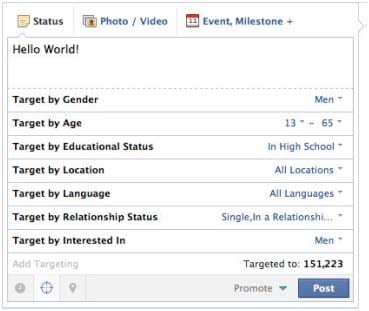A briefing on Facebook Page Post Targeting Enhanced advertising feature
Facebook Newsfeed HyperTargeting is a relatively new Facebook feature (officially referred to as “Page Post Targeting Enhanced”) that enables pages to deliver more relevant messaging to their Facebook fans.
In short, Facebook Newsfeed HyperTargeting increases the targeting accuracy of posts by increasing the types of posts segments a community manager can target. Previously, pages could only deliver “one-size-fits-all” posts, or segment posts against locations or languages.
 The more robust segmentation criteria allows pages to segment their posts to their audience’s newsfeed using additional criteria, including:
The more robust segmentation criteria allows pages to segment their posts to their audience’s newsfeed using additional criteria, including:
- Age
- Education
- Gender
- Workplace
- Interests
- Language and Location
- Relationship Status
Marketing Implications
The low barrier to development and deployment of segmented messaging using this tool allows for micro-segmented, personalized message deployment at scale. This has the potential to dramatically increase your Page engagement rate. As such, Facebook Newsfeed HyperTargeting lends itself naturally to integration within your Social Media Optimization (SMO) initiatives, as follows:
- Identify (and size) your micro-segments. A great feature of the tool is that as you segment your fan base, the platform will adjust market size of the segment on the fly. Note that the segments you should choose will vary by vertical and company.For example, a sports interest based segmentation might be ideal for a sports camp, whereas an age-based segmentation would be more effective for a financial services company.
- Monitor, test, and report on engagement levels in each of your micro-segments. Monitoring engagement levels by segment will lead to an always-on planning scenario of continually evolving messaging and segmentation strategy.
- Evolve your monthly content calendar strategy accordingly. Additional calendars should be developed with these pre-identified micro-segments in mind. This will of course require additional planning and development time.
- Supercharge engagement levels by supplementing posts (organic social listings) with sponsored stories. At the end of the day, the benefit of this tool will be to increase the engagement with your audience by delivering more relevant messaging.Keep in mind that on average only approximately 16% of your audience will ever see any given post, and only 1% of that group will ever engage (defined as sharing, commenting, or liking).Sponsored stories will increase your level of engagement by increasing the number of your fans that see your posts which then naturally increases the volume of sharing, commenting and likes.
- Keep an eye on your timeline brand experience. A media analogy would be to think of your Timeline as your TV commercial and your segmented posts as your direct (one-to-one) mail. As a marketer, you typically don’t want the highly targeted messaging you’re deploying to direct mail segments as you might for your general brand target in a TV commercial.If you’re doing a lot of segmented messaging, all stories you post will still show up on your wall to your entire fan base. Consider deleting highly niche posts as needed if the overall message you’re trying to convey on your Page becomes diluted to your general target.
- Ask your agency for a Facebook optimization audit. This is a key element of the ZOG Digital Facebook social media optimisation offering for conversational micro-targeting. We cater messaging by segment, monitoring trends related to segment interest, and creating posts to speak to pre-identified micro-targets. Your custom audit will help identify key opportunities to harness this and your other Facebook optimization opportunities.
This advice was created by ZOG Digital, a search and social marketing technology company.
Thanks to
Greg Getner for sharing his advice and opinions in this post. Greg is the Senior Vice President of Strategy and Social Marketing. He is an alumnus of Saatchi & Saatchi, iCrossing, and Digitas, where he developed multi-channel strategic initiatives for JetBlue, American Express, Mercedes-Benz, Toyota, Procter & Gamble, and many other Fortune 100 clients.In his spare time when he isn’t busy identifying opportunities for clients to conquest market share, you might find him dancing Argentine tango, playing chess, or sweating it up in a hot yoga class. You can follow Zoedigital on
Twitter or connect on
LinkedIn.








